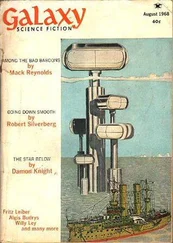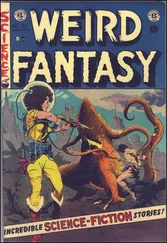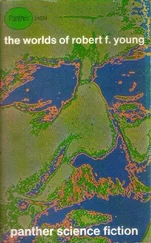| Robert Silverberg |
Роберт Силверберг |
| HALFWAY HOUSE |
Пересадочная станция |
| Afterward, Alfieri realized that you must give a life to gain a life. |
Много позже Олфайри понял, что ради жизни надо отдать жизнь. |
| Now, he was too interested simply in staying alive to think much about profundities. |
Тогда он просто думал о том, как остаться в живых. |
| He was l'uomo dal fuoco in bocca, the man with fire in his mouth. |
Он был l'uomo dal fuoco in bocca, человек с огнем во рту. |
| Cancer clawed at his throat. |
Рак жег ему горло. |
| The vocoder gave him speech; but the raging fire soon would burn through to the core of him, and there would be no more Franco Alfieri. That was hard to accept. |
Говорил он с помощью механического имитатора, но опухоль грозила прокрасться в мозг, еще немного - и Франко Олфайри перестал бы существовать. |
| So he came to the Fold for aid. |
Поэтому он обратился к помощи Провала. |
| He had the money. |
У него были деньги. |
| That was what it took, in part, to enter that gateway of worlds: money, plenty of it. |
Именно они позволили ему войти в дверь, соединяющую миры. Деньги, много денег. |
| Those who ran the Fold did not do it for sweet charity's sake. |
Те, кто управлял Провалом, ничего не делали из альтруистических побуждений. |
| The power drain alone was three million kilowatts every time the Fold was opened. |
Каждый раз на то, чтобы открыть Провал, уходило три миллиона киловатт. |
| You could power a good-sized city on a load like that. |
Этой энергии могло бы хватить довольно большому городу. |
| But Alfieri was willing to pay what it cost. |
Но цена не смущала Олфайри. |
| The money would shortly be of no use to him whatever, unless the beings on the far side of the Fold gave his life back to him. |
Деньги вряд ли понадобятся ему, если существа на другом конце Провала не вернут его к жизни. |
| "You stand on that bedplate," a technician told him. "Put your feet along the red triangular areas. |
- Встаньте на эту пластину, - буркнул механик. -Поставьте ноги вдоль красной полосы. |
| Grasp the rail-so. |
Возьмитесь за поручень. Вот так. |
| Then wait." |
Теперь ждите. |
| Alfieri obeyed. |
Олфайри повиновался. |
| He was no longer in the habit of taking such brusque orders, but he forgave the man for his rudeness. |
Давно уже к нему не обращались в повелительном наклонении, но он простил механику его грубость. |
| To the technician, Alfieri was so much wealthy meat, already going maggotty. |
Для механика Олфайри был лишь куском дорогого мяса, в котором уже завелись черви. |
| Alfieri positioned his feet and looked down at the mirror-bright polish of his pointed black shoes. He grasped the furry yellow skin of the rail. |
Олфайри вгляделся в зеркальный блеск остроносых черных туфель и крепче сжал ворсистый чехол поручня. |
| He waited for the power surge. |
Он ждал прихода энергетической волны. |
| He knew what would happen. |
Олфайри представлял, что должно произойти. |
| Alfieri had been an engineer in Milan, twenty years back, when the European power grid was just coming in. |
В Милане двадцать лет назад, когда создавалось европейское энергетическое кольцо, он был инженером. |
| He understood the workings of the Fold as well as-well, as well as anyone else who was not a mathematician. |
Он понимал механизм действия Провала так же хорошо, как... ну, как любой другой инженер, но не математик. |
| Alfieri had left engineering to found an industrial empire that sprawled from the Alps to the blue Mediterranean, but he had kept up with technology. He was proud of that. He could walk into any factory, go straight to a workbench, display a rare knowledge of any man's labor. Unlike most top executives, his knowledge was deep as well as broad. |
Олфайри оставил инженерную деятельность, чтобы основать промышленную империю, которая простерлась от Альп до голубого Средиземноморья. Тем не менее он продолжал интересоваться достижениями техники и гордился тем, что, придя на завод, мог подойти к любому станку и сказать, что делает рабочий. |
| Alfieri knew, then, that when the power surge came, it would momentarily create a condition they called a singularity, found in the natural universe only in the immediate vicinity of stars that were in their last moments of life. |
Олфайри знал, что энергетическая волна на мгновение создаст особое состояние, которое называлось сингулярным, в естественном виде оно встречалось лишь в непосредственной близости от звезд в последние мгновения их жизни. |
| A collapsing star, a spent supernova, generates about itself a warp in the universe, a funnel to nowhere, the singularity. |
Коллапсирующая звезда, бывшая сверхновая, создает вокруг себя искривление пространства, тоннель в никуда, черную дыру. |
| As the star shrinks, it approaches its Schwarzchild radius, the critical point when the singularity will devour it. |
Сжимаясь, звезда своими размерами приближается к сфере Шварцшильда, по достижении которой черная дыра поглощает ее. |
| Time runs more slowly for the dying star, as it nears the radius; its faint light shifts conspicuously toward the red; time rushes to infinity as the star is caught and swallowed by the singularity. |
На подходе к критическому диаметру время для умирающей звезды течет гораздо медленней, но ускоряется до бесконечности, когда звезда поймана и заглатывается черной дырой. |







